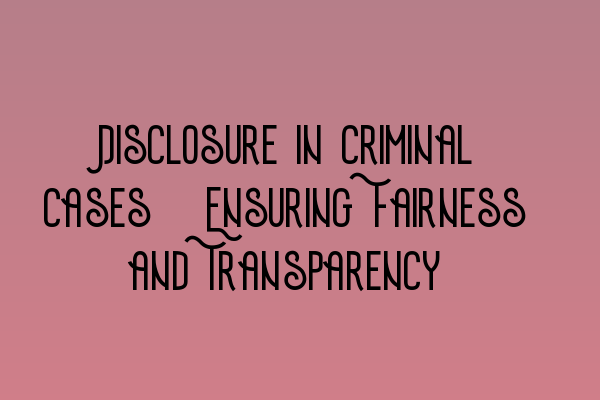Disclosure in Criminal Cases: Ensuring Fairness and Transparency
Disclosure of evidence plays a pivotal role in ensuring fairness and transparency in criminal cases. It is an essential process that allows both the prosecution and the defense to access and examine the evidence gathered by the investigating authorities. The proper disclosure of evidence enables the parties involved to build their respective cases in a fair and just manner.
The Importance of Disclosure
Disclosure is vital because it guarantees that all parties have equal access to the evidence, safeguarding the principle that everyone is innocent until proven guilty. It allows the defense to scrutinize the prosecution’s case, identify weaknesses and inconsistencies, and challenge the evidence presented. Additionally, it enables the prosecution to fulfill its duty of providing all relevant evidence, including any material that may support the defense’s case.
Failure to disclose evidence can lead to miscarriages of justice, as crucial information may be hidden from the parties involved, compromising their ability to prepare an effective defense. In order to ensure a fair trial and uphold the principles of justice, it is imperative that disclosure is carried out thoroughly and in a timely manner.
The Challenges in Disclosure
While disclosure is crucial, it is not without its challenges. One of the major challenges is the volume of evidence involved in modern criminal cases. With the advancements in technology and digital storage, the amount of data gathered during investigations has significantly increased. Dealing with vast quantities of evidence requires efficient systems and procedures to ensure that relevant material is properly identified, reviewed, and disclosed.
Furthermore, issues such as third-party disclosure and sensitive information must be carefully considered. Third-party disclosure may involve evidence held by external entities, such as businesses, medical professionals, or government agencies. The process of obtaining this evidence and incorporating it into the disclosure can be complex and time-consuming.
Similarly, the disclosure of sensitive information, such as confidential informants or national security matters, requires careful handling to balance the need for transparency with the protection of legitimate interests. Clear guidelines and procedures are necessary to address these challenges effectively.
Improving the Disclosure Process
In order to address the challenges posed by disclosure, the criminal justice system should continuously strive for improvement. Embracing technological advancements can streamline the disclosure process, enabling more efficient organization, review, and sharing of evidence.
Moreover, training programs and continuing professional development for legal practitioners involved in disclosure can enhance their understanding of the process and the importance of fulfilling their obligations. Regular updates on legal requirements and best practices can help ensure that everyone involved is well-equipped to handle disclosure effectively.
Collaboration and communication among the various stakeholders in the criminal justice system are also crucial. Prosecutors, defense attorneys, investigators, and judges must work together to establish clear guidelines and maintain open lines of communication to address any issues that may arise during the disclosure process.
Conclusion
Disclosure in criminal cases is a fundamental component of a fair and transparent justice system. It allows for the examination and evaluation of evidence by both the prosecution and the defense, ensuring that all parties have equal access to the information necessary to present their cases effectively. Addressing the challenges of disclosure requires a commitment to continuous improvement, embracing technology, training and development, and effective collaboration among all stakeholders.
For more information on the SQE Criminal Law & Practice Law in the UK, feel free to check out our related articles:
- SQE 1 Practice Exam Questions
- SQE 1 Practice Mocks FLK1 FLK2
- SQE 2 Preparation Courses
- SQE 1 Preparation Courses
- SRA SQE Exam Dates
